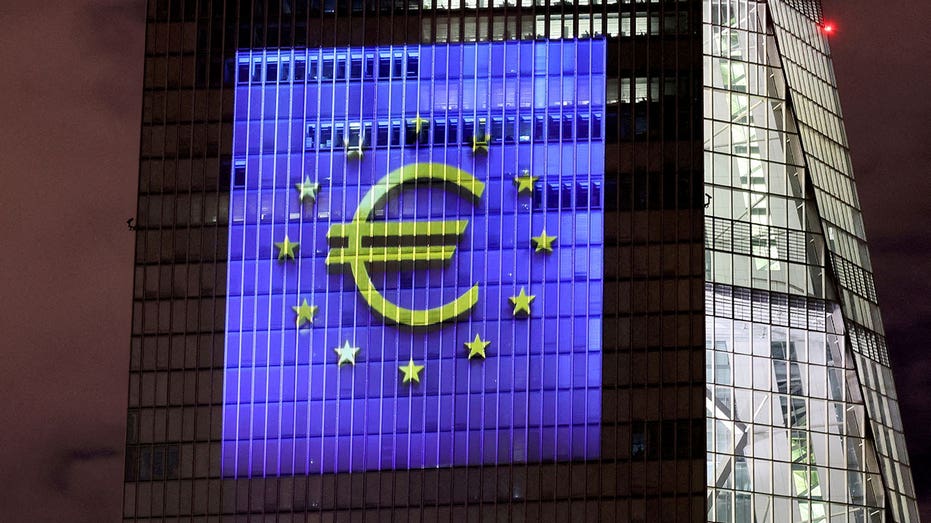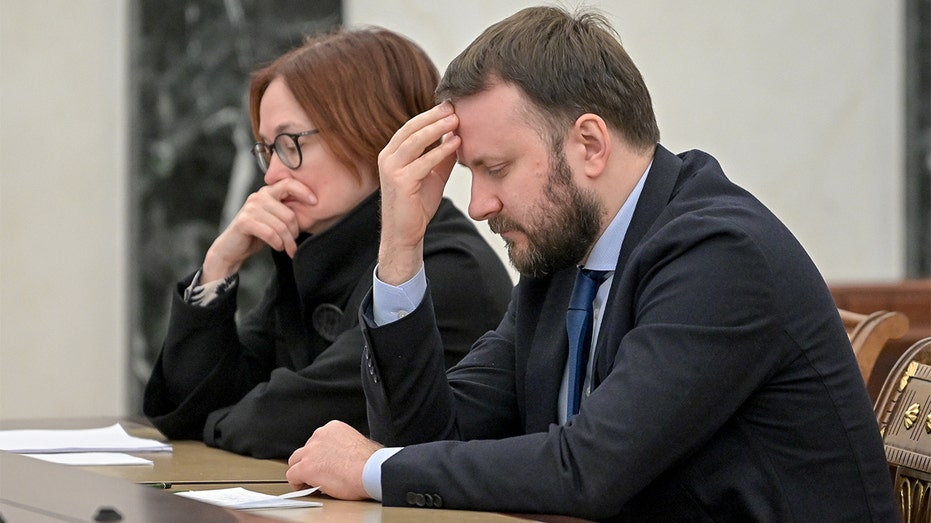ECB raises rates by half-percentage point in first hike since 2011
The Euro initially surged before it reversed it gains on the day and finished down 0.1%
The European Central Bank raised interest rates by a larger-than-expected half-percentage point and unveiled a new plan to buy the debt of Europe’s most vulnerable economies, taking bold action to protect the currency union as it navigates the twin threats of skyrocketing inflation and slowing economic growth.
The move takes the ECB’s key interest rate to zero, ending the bloc’s eight-year experiment with negative interest rates and capping two weeks of drama for Europe, which saw Russia cut and then restart supply of vital natural gas and the government of Italy collapse.
The rate increase comes despite rapidly accumulating challenges facing Europe’s economy and the currency union’s cohesion—from a looming energy crisis to a protracted war next door, mounting political instability at home, and what many economists think has become an inevitable recession. Some of these could make it difficult for the ECB to focus on combating inflation.
The ECB’s decision brings it more into line with other central banks, including the Federal Reserve, underscoring how the bank’s top officials are increasingly worried about high inflation. The Fed is expected to raise its policy rate by 0.75 percentage point later this month to a range between 2.25% and 2.5%. Inflation has risen to about 9% on both sides of the Atlantic, and shows no sign of abating soon.
RECESSION 'IS HERE' AND WILL 'LAST FOR AWHILE,' FORMER WHITE HOUSE ECONOMIST SAYS

A symphony of light consisting of bars, lines and circles in blue and yellow, the colours of the European Union, illuminates the south facade of the European Central Bank (ECB) headquarters in Frankfurt, Germany, Dec. 30, 2021. (REUTERS/Wolfgang Rattay/File Photo / Reuters Photos)
"There was tremendous pressure going into this meeting," said one person familiar with the ECB’s discussions. "The euro is weak, and you have the Fed which might raise rates by 75 or even 100 basis points. And then you come out with 25?"
Financial markets ricocheted after news of the increase. The euro initially climbed, rising 0.7% against the dollar to $1.0248, but later fell back and was unchanged on the day. Italy’s benchmark FTSE MIB stock index cut earlier losses to trade down 0.9%, while the pan-continental Stoxx Europe 600 wavered between small gains and losses.
EU CALLS FOR RATIONING NATURAL GAS, SAYS RUSSIA ‘BLACKMAILING US’
The spread between benchmark Italian and German government bond yields, a key measure of financial stress in the eurozone, trimmed some of its gains from earlier in the day to hover around 2.23 percentage points.
For weeks, ECB President Christine Lagarde had telegraphed that the ECB would raise rates only gradually, starting with a quarter-percentage point this month. On Thursday, she said the bank expected inflation to remain high for some time, partly due to the euro’s falling exchange rate against the dollar, which raises import prices.
Thursday’s twin announcement reflects a compromise within the bank. While monetary policy hawks on its boards had long pleaded for a big rate increase to combat inflation, those from heavily indebted countries feared this could spook investors, making it hard for them to roll over this debt, especially given mounting recession risks.
GERMANS MAY HAVE TO RATION HOT WATER IF RUSSIA CUTS OFF GAS SUPPLY
The combination of a robust rate rise and a new policy instrument designed to shield some of the bloc’s most indebted members from excessive borrowing costs was a bargain between the two positions, people familiar with the matter said.
The new instrument is the latest addition to the ECB’s crisis-fighting arsenal. A decade ago, former ECB President Mario Draghi unveiled an unlimited bond-buying program, known as Outright Monetary Transactions, that swiftly ended the region’s debt crisis, even though it has never been used.
In a context of tightening monetary policy, high inflation and jittery markets, this protective shield is losing power. When Ms. Lagarde said in early June that the ECB would increase interest rates by a modest quarter point this month, sovereign-bond yields rose across Southern Europe.
Days later, ECB officials convened an emergency meeting and hashed out a plan to create a new bond-buying tool that could shield the south from higher borrowing costs.
The new tool will have easier conditions than Mr. Draghi’s OMT, making it easier to deploy at speed, and like the OMT, it is potentially unlimited in scale. It will target sovereign and potentially private debt to curb unwarranted increases in borrowing costs in parts of the bloc, the ECB said.
ECB officials hope that, as with the OMT program, the new bond-buying tool will calm markets without needing to be used.
"We would anticipate the market will test the ECB’s resolve with the new" bond-buying program, said David Zahn, head of European fixed income at Franklin Templeton.
The instrument could also be controversial, with some economists noting it gave the ECB much discretion as to which countries to support, bringing it close to the banned practice of monetary financing of governments. This could invite legal challenges in parts of the bloc.

Russian Presidential Aide Maxim Oreshkin (R) and Russian Central Bank Governor Elvira Nabiullina attend a meeting on economic issues held by Russia's President Vladimir Putin at the Moscow Kremlin, Feb. 28, 2022. (Photo by Alexei NikolskyTASS via Get (Alexei NikolskyTASS via Getty Images / Getty Images)
Economists say the ECB faces a particularly delicate task in taming inflation partly because of the numerous shocks currently pummeling the eurozone economy, from higher energy prices and reductions in natural-gas supplies to surging borrowing costs and political turmoil in some countries.
On Thursday, Russia resumed gas delivery through the Nord Stream pipeline after a 10-day maintenance stop, prompting relief across European capitals. Some governments had feared Moscow could cut supplies for good, leaving millions without heating this winter, thousands of factories facing closure, and threatening a steep recession.
Still, Europe is bracing for an unreliable supply of gas heading into the winter, which will weigh on the region’s prospects. Gas is currently flowing through the pipeline at about 40% of its maximum volume. This will make it hard for governments to fill storages ahead of the cold season, making them vulnerable to the Kremlin’s whims.
ECB PLANS JULY RATE INCREASE AS INFLATION PROBLEM DEEPENS
Europe’s businesses and households are already being squeezed by surging costs for energy and other goods. Eurozone consumer confidence hit its lowest level on record in July, according to data published Wednesday, depressed by high energy prices and the protracted war in Ukraine.
While the bloc’s economy grew at a faster pace than previously in the first three months of the year, growth likely slowed in the three months through June as surging energy prices weakened households’ spending power and pushed business costs up. The economy seems set for a winter contraction if energy prices remain high.
Recent weeks have also acted as a reminder of the region’s political fragility. The resignation of Mr. Draghi, now Italy’s prime minister, on Thursday following the collapse of his coalition government sent the gap between yields on 10-year Italian government bonds and their German equivalent, a gauge of risk for investors, up to 2.3 points from about 1.3 points at the start of the year. The yields on Italy’s 10-year government bonds have surged over the past 24 hours as it became clear that Mr. Draghi would resign.

People walk past a currency exchange office screen displaying the exchange rates of U.S. Dollar and Euro to Russian Rubles in Moscow's downtown. (AP Photo/Pavel Golovkin / AP Newsroom)
The political drama and the market reaction so far have raised the specter of a return to the eurozone crisis that broke out in 2010 and lasted for several years, bringing the eurozone close to a break up and triggering a recession that Italy in particular has yet to fully recover from.
With the economic outlook darkening, some ECB officials worried that the bank would miss the window of opportunity for increasing rates. By the ECB’s next policy meeting in September, the bloc could be close to or in recession.
CLICK HERE TO READ MORE ON FOX BUSINESS
Investors currently expect the ECB to increase interest rates to about 1% by the end of this year, and 1.5% next year—still too little, some analysts say, to bring inflation back to the ECB’s target rate of 2%.
"The only way to solve the inflation issue is to focus 100% on bringing inflation back down, which the ECB will not do because they always have an eye on growth," said Joerg Kraemer, chief economist at Commerzbank in Frankfurt.




















